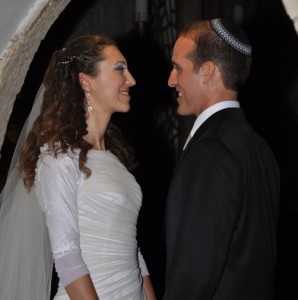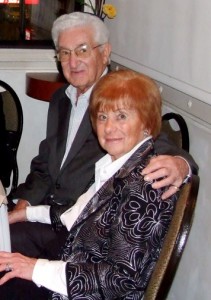
The look of love you see here is the first stage - that heady love that is a gift from G-d - next comes the step of working at building love.
Arranged marriage seems to be a topic of pretty heated debate these days. Most Westerners, or any youth of today who are influenced by “Western” ideas and values, are strongly against arranged marriage. However, for many thousands of years, arranged marriage was the way to go. And in many cultures, it’s still practiced today.
In fact, arranged marriages are still quite popular among the more religiously observant groups of Jews. I know personally and closely many couples who became engaged after only meeting one another once or twice, for a short period of time. The entire meeting and marriage was arranged by their families. They’re still happily married. So something about arranged marriage seems to be working at least as well as a marriage that is not arranged, if not better. Why? And how?
We find the answers to both of these questions in one simple line in this week’s parsha. This week is the parsha where Avraham (Abraham) sends his servant Eliezer out to find a wife for Yizchak (Isaac). Yizchak doesn’t seem to get any say in the choosing of his wife-to-be – nobody even asks him what he thinks or what he’s looking for in a woman. They don’t need to. They are the people who know him best, so they know exactly what to look for. Sure enough, Eliezer comes back with Rivka (Rebecca) as a wife for Yitzchak. Yitchak takes Rebecca into his mother’s tent, marries her, and then loves her.
That’s a strange order to do things in, if you think about it. Today, couples fall in love, then they live together, then they get married. Instead, Yitzchak gave Rivka her own tent (rather than sharing one with her), then he marries her, and only then does he fall in love with her. What’s going on?
The answer here is the same as to the above questions of why and how arranged marriage works in the first place. You see, Yitzchak is the first arranged marriage in Tanach (the Bible) and we learn a lot about how marriage is supposed to work from it. Love is not something that we are supposed to just fall into, it’s something we’re supposed to build. Perhaps this is why so many marriages today fall apart – people expect to fall in love and they expect it to last. But, as I learned in a shiur at Neve Yerushalayim by Mrs. Halberstadt, that the Kabbalah teaches that the first burst of love-excitement, that heady feeling with the butterflies in the stomach, is a gift from G-d, to show you what you could have in the future, if you work for it. That feeling doesn’t last long – maybe a few months, maybe a few years, but it won’t last your entire lives… unless you work at it. If you work at it and build it, that feeling comes back.
In arranged marriages, couples do have the chance to meet and both parties must consent (at least it works this way in most cultures), but they aren’t together enough to fall in love. Instead, they either get that spontaneous and exciting feeling after they’re married – or they work at it together and they build love. They have no expectation that the feeling of falling in love should last forever and so they are not disappointed when it is not there. Instead, they do have an expectation that if they both want to be in love, they have to cultivate that feeling of love.

The love we see elderly couples sharing is the third stage - the love they've built over many decades
And how do we cultivate a feeling of love? By giving. Giving of oneself to another is the best way to cultivate a feeling of mutual love. Think about a time when someone went out of their way to give you something – and not just anything, but something really desirable to you, perhaps something you strongly needed or wanted, something they had to think about in order to give it to you. It could have been something material or it could have been something ephemeral, like a shoulder to cry on or an ear to listen or a hug, just when you needed it. Either way, remember how it made you feel. You felt a surge of affection for the person who went out of their way to show you they cared. And think about how it felt to be the one giving in a similar situation. You felt a surge of compassion, affection, and caring for the person you were giving to. The more you give like this and the more one person gives like this to you, the closer the two of you become. Eventually, this mutual giving blossoms into love.
The Torah comes to teach us that love is not like what we read in the romance novels (although we do learn that Rivka almost fell off her camel when she saw Yitzchak because he was such a hunk, and we see that Yaakov (Jacob) was willing to work 14 years in order to be allowed to marry Rochel (Rachel)). We learn from the Torah that although physical attraction is an important component, love takes more work, is built, and comes later.
In the coming week, let us all work on building and increasing the love in our lives! Shabbat shalom!
4 Responses to “Parshas Chayei Sarah: Isaac & Rebecca Teach Us What Love Is”
Trackbacks/Pingbacks
- Parshas Chayei Sarah: To Love a Child | Travelling Rabbi - [...] Read more on Parshas Chayei Sarah: Isaac and Rebecca Teach us what Love Is [...]






Rachel,
That analysis was very well written. Its true..love takes work and building, what a great parsha to explain that. I’m so happy for you and your building love with your husband. I know with gods help I too shall find that one day. Best. Pam